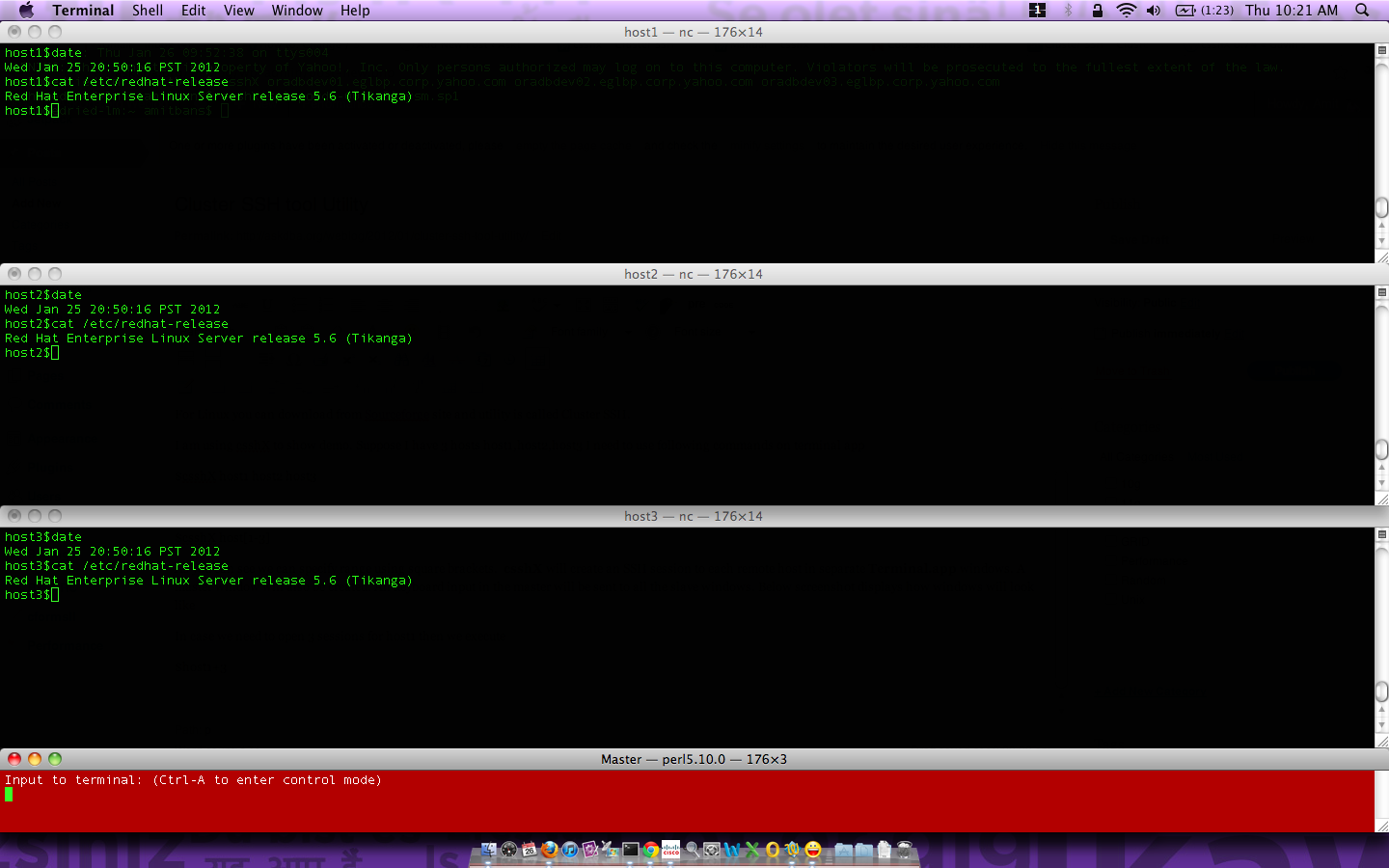You can find below various commands which can be used to administer Oracle Clusterware using crsctl. This is for purpose of easy reference.
Start Oracle Clusterware
#crsctl start crs
Stop Oracle Clusterware
#crsctl stop crs
Enable Oracle Clusterware
#crsctl enable crs
It enables automatic startup of Clusterware daemons
Disable Oracle Clusterware
#crsctl disable crs
It disables automatic startup of Clusterware daemons. This is useful when you are performing some
operations like OS patching and does not want clusterware to start the daemons automatically.
Checking Voting disk Location
$crsctl query css votedisk
0. 0 /dev/sda3
1. 0 /dev/sda5
2. 0 /dev/sda6
Located 3 voting disk(s).
Note: -Any command which just needs to query information can be run using oracle user. But anything which alters Oracle Clusterware requires root privileges.
Add Voting disk
#crsctl add css votedisk path
Remove Voting disk
#crsctl delete css votedisk path
Check CRS Status
$crsctl check crs
Cluster Synchronization Services appears healthy
Cluster Ready Services appears healthy
Event Manager appears healthy
You can also see particular daemon status
$crsctl check cssd
Cluster Synchronization Services appears healthy
$crsctl check crsd
Cluster Ready Services appears healthy
$crsctl check evmd
Event Manager appears healthy
You can also check Clusterware status on both the nodes using
$crsctl check cluster
prod01 ONLINE
prod02 ONLINE
Checking Oracle Clusterware Version
To determine software version (binary version of the software on a particular cluster node) use
$crsctl query crs softwareversion
Oracle Clusterware version on node [prod01] is [11.1.0.6.0]
For checking active version on cluster, use
$ crsctl query crs activeversion
Oracle Clusterware active version on the cluster is [11.1.0.6.0]
As per documentation, multiple versions are used while upgrading.
There are other options for CRSCTL too which can be seen using
$crsctl
Or
$crsctl help
11.2 Reference
11.2 introduced few changes to crsctl usage. Most important is clusterized commands which allows you to perform remote operations. They are
- crsctl check cluster
- crsctl start cluster
- crsctl stop cluster
All these commands allow following usage
Default Stop local server
-all Stop all servers
-n Stop named servers
server […] One or more blank-separated server names
-f Force option
Let’s see usage
% crsctl check cluster -all
**************************************************************
prod01:
CRS-4537: Cluster Ready Services is online
CRS-4529: Cluster Synchronization Services is online
CRS-4533: Event Manager is online
**************************************************************
prod02:
CRS-4537: Cluster Ready Services is online
CRS-4529: Cluster Synchronization Services is online
CRS-4533: Event Manager is online
**************************************************************
crsctl pin css is used to associate node name with node number. i.e if olsnodes shows prod01 as 1, then it should persist. This is helpful if you intend to run pre 11.2 database
#crsctl pin css -n prod01
#crsctl pin css -n prod02
To check daemon status, following commands need to be used
Check crsd – crsctl check crs
Check cssd – crsctl check crs
check evmd – crsctl check evm
crs_unregister is replaced by crsctl delete resource <resource_name>
crs_stat has been deprecated (though still works) and you need to use
$crsctl stat res -t
e.g
--------------------------------------------------------------------------------
NAME TARGET STATE SERVER STATE_DETAILS
--------------------------------------------------------------------------------
Local Resources
--------------------------------------------------------------------------------
ora.DATA.dg
ONLINE ONLINE prod01
ONLINE ONLINE prod02
ora.FLASH.dg
ONLINE ONLINE prod01
ONLINE ONLINE prod02
ora.LISTENER.lsnr
ONLINE ONLINE prod01
ONLINE ONLINE prod02
ora.asm
ONLINE ONLINE prod01 Started
ONLINE ONLINE prod02 Started
ora.gsd
OFFLINE OFFLINE prod01
OFFLINE OFFLINE prod02
ora.net1.network
ONLINE ONLINE prod01
ONLINE ONLINE prod02
ora.ons
ONLINE ONLINE prod01
ONLINE ONLINE prod02
ora.registry.acfs
ONLINE ONLINE prod01
ONLINE ONLINE prod02
--------------------------------------------------------------------------------
Cluster Resources
--------------------------------------------------------------------------------
ora.LISTENER_SCAN1.lsnr
1 ONLINE ONLINE prod01
ora.cvu
1 ONLINE ONLINE prod01
ora.oc4j
1 ONLINE ONLINE prod01
ora.prod01.vip
1 ONLINE ONLINE prod01
ora.prod02.vip
1 ONLINE ONLINE prod02
ora.scan1.vip
1 ONLINE ONLINE prod01
ora.tintin.db
1 ONLINE ONLINE prod01 Open
2 ONLINE ONLINE prod02 Open
Wrote following awk command to give output on one line
crsctl status res |grep -v "^$"|awk -F "=" 'BEGIN {print " "} {printf("%s",NR%4 ? $2"|" : $2"\n")}'|sed -e 's/ *, /,/g' -e 's/, /,/g'|\
awk -F "|" 'BEGIN { printf "%-40s%-35s%-20s%-50s\n","Resource Name","Resource Type","Target ","State" }{ split ($3,trg,",") split ($4,st,",")}{for (i in trg) {printf "%-40s%-35s%-20s%-50s\n",$1,$2,trg[i],st[i]}}'
output
Resource Name Resource Type Target State
ora.DATA.dg ora.diskgroup.type ONLINE ONLINE on prod01
ora.DATA.dg ora.diskgroup.type ONLINE ONLINE on prod02
ora.FLASH.dg ora.diskgroup.type ONLINE ONLINE on prod01
ora.FLASH.dg ora.diskgroup.type ONLINE ONLINE on prod02
ora.LISTENER.lsnr ora.listener.type ONLINE ONLINE on prod01
ora.LISTENER.lsnr ora.listener.type ONLINE ONLINE on prod02
ora.LISTENER_SCAN1.lsnr ora.scan_listener.type ONLINE ONLINE on prod01
ora.asm ora.asm.type ONLINE ONLINE on prod01
ora.asm ora.asm.type ONLINE ONLINE on prod02
ora.cvu ora.cvu.type ONLINE ONLINE on prod01
ora.gsd ora.gsd.type OFFLINE OFFLINE
ora.gsd ora.gsd.type OFFLINE OFFLINE
ora.net1.network ora.network.type ONLINE ONLINE on prod01
ora.net1.network ora.network.type ONLINE ONLINE on prod02
ora.oc4j ora.oc4j.type ONLINE ONLINE on prod01
ora.ons ora.ons.type ONLINE ONLINE on prod01
ora.ons ora.ons.type ONLINE ONLINE on prod02
ora.prod01.vip ora.cluster_vip_net1.type ONLINE ONLINE on prod01
ora.prod02.vip ora.cluster_vip_net1.type ONLINE ONLINE on prod02
ora.registry.acfs ora.registry.acfs.type ONLINE ONLINE on prod01
ora.registry.acfs ora.registry.acfs.type ONLINE ONLINE on prod02
ora.scan1.vip ora.scan_vip.type ONLINE ONLINE on prod01
ora.snowy.db ora.database.type OFFLINE OFFLINE
ora.snowy.db ora.database.type ONLINE OFFLINE
ora.tintin.db ora.database.type ONLINE ONLINE on prod01
ora.tintin.db ora.database.type ONLINE ONLINE on prod02
ora.tintin.tintin_db_svc.svc ora.service.type ONLINE ONLINE on prod02
ora.tintin.tintin_ggate_svc.svc ora.service.type ONLINE ONLINE on prod01


Recent Comments